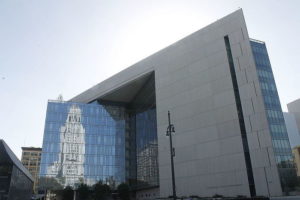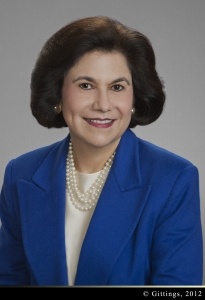
FURTHER MOVE that the City Ccl request the Police Commission to cease their enforcement against the City’s Downtown Center BID and its private patrol service, and any other BIDs until this matter has been reviewed by the City Ccl.
This at least seems to explain a temporary pause in enforcement, although not a policy-based reason never to enforce the registration requirement and the other regulations.
Furthermore, even a trip to the City Archives to copy the whole file left me lacking a definitive answer to the question of why no BID security provider was registered with the Police Commission. Also, I reported last week that no one in the City, either at the Police Commission or elsewhere, seemed to have a firm idea about why this was.

Here’s the new material: From the minutes of May 4, 1999, we have comments by Carol Schatz and Randall Ely of the Downtown Center BID. They’re commenting on an earlier version of this recommendation from the Commission to the Council on what to do about BID Security and LAMC 52.34.1
First read the recommendations. Here’s the context in which that document was prepared:
On April 15, 1999, the Police Commission hosted a meeting with representatives from the Business Improvement Districts (BID) as requested by Public Safety Committee Chairperson Laura Chick. The purpose of this meeting was to discuss modification and/or exemption of existing City Ordinance LAMC 52.34 and Police Commission Board Rules relative to Private Patrol Services and Special Officers to accommodate the concept of the BID. Invitations were extended to 30 BIDS, and representatives from four attended the meeting.2 The following exemptions and modifications are proposed by Police Commission Staff to allow the BID’s to operate under less strict guidelines.

Now go back to the recommendation, which was approved by the Police Commission on May 18, 1999, and transmitted to the Council the next day:
It is recommended that the Board of Police Commissioners approve the items listed under “Discussion”, forward this report to the City Council, and reaffirm to the BID’s that, until the City Council takes action, the Police Commission will continue to cease enforcement against the BID’s.
Recall that in March 1999, when the Council file was initiated, the motion directed the Police Commission to cease enforcement against the Downtown Center BID until the Council sorted things out. It’s clearly not fair to cease enforcement against just one BID, so I’m speculating that the Commission extended that to a pause in enforcement against all BIDs “until the City Council takes action.”
Well, the City Council didn’t take action until August 5, 2000, when they amended LAMC 52.34 in a way which didn’t include ANY language exempting BIDs. Enforcement of the law with respect to the BIDs should have resumed at this point. My theory is that by this time, 17 months after the Council told the Commission to stop enforcing the law against the BIDs, everyone was so used to BID security not being regulated that they just never started up again. A year and a half is a long time, and without some explicit directive from the Council to resume enforcement, it’s perfectly plausible that no one remembered to do so. This theory might be wrong, but it fits all the facts and no one at the City (or elsewhere) seems to have a better one. In any case, if this is correct, and I really think it is, enforcement should have resumed in August 2000. It didn’t, but it surely ought to resume now.
It’s interesting to speculate on what might happen in a future where BID security is again regulated by the Commission. First, and most crucially, persons3 who are required to obtain permits from the Commission are subject to regulation under LAMC 103.00 et seq. This contains an exhaustive list of requirements for permit holders, as well as a comprehensive list of Board powers over permit holders, which include investigative powers, the power to bar permit holders from future activity which requires permits, and so on. Permit holders can be disciplined and permits revoked for any one of a number of reasons, many of which apply to current BID security forces. If they’re found to be subject to this regulatory scheme, e.g., the Selma Park fiasco would be enough to tie them up in regulatory hearings for a good long time and might even result in the revocation of their ability to do business with BIDs. It’s possible that the Hollywood BID Patrol might have to get new uniforms.

Mr. Leder commented on the private police working for the Hollywood Business Improvement District. He stated that the private police officers take suspects to their own station before taking them to the police station. He also commented on how the Hollywood Community Police Advisory Board does not have a fixed time and place for their meetings and how the Board is being controlled by the Chamber of Commerce.
Commissioner Chaleff then instructed Executive Director Joe Gunn to monitor the Hollywood Business Improvement District private patrol.
It’s interesting enough that even back then people were worried about the BID Patrol’s practice of physically arresting and transporting its victims, but the really important point is that in June 1999, a month after approving the recommendation discussed above, the Police Commission assumed that monitoring of BID security was well within their purview. In other words, even though they’d agreed to cease enforcement of LAMC 52.34 against BID security, they saw nothing in that to contradict their right to order their staff to monitor the Hollywood BID Patrol. This alone, irrespective of the rest of my arguments, seems to mean that the Commission can indeed regulate BID security. We are certainly going to find out in the coming months, friends, and you’ll be able to read all about it here.
Image of Joseph Gunn is deeplinked to, so copyright is not an issue. Likewise the images of Edith Perez and Gerald Chaleff. The image of LAPD headquarters is freely licensed and available from Wikimedia.
- This document was actually present in the Council file, transmitted by the Commission on May 19, 1999. I missed the significance of it at that time, however.
- If I had to guess I’d guess that these were the DCBID, the CCEA, the HPOA, and either the Historic Core or the Fashion District. It’s probably impossible to be sure at this late date, however. In particular, the DCBID and the Historic Core claim to have lost their 1999 Board minutes (which, interestingly, is a violation of the California State Corporations Code; more on this in the future). I have the HPOA 1999 minutes but I haven’t had time to read through them, and the Fashion District Minutes from 1999 have some information about this, but I don’t have copies yet and I’m not confident in my ability to reproduce it accurately from my notes alone. I’ll be publishing the documents and writing on it here soon.
- In the legal sense; that is either individuals or corporations.
